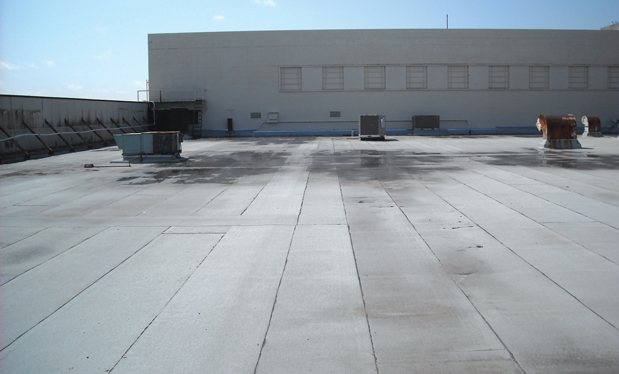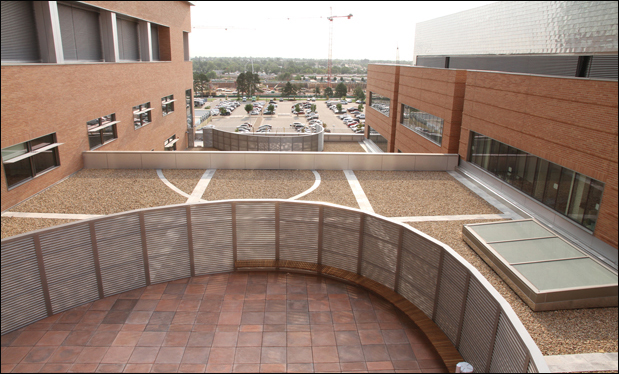In May, legislation was introduced in Congress to reform the outdated depreciation schedule for certain energy-efficient commercial roof systems. Passing such legislation has long been a goal of NRCA because it will remove an obstacle in the tax code that limits economic growth in the roofing industry, facilitating significant new job creation among roofing contractors, manufacturers and other roofing industry entrepreneurs.
Long overdue
Between 1981 and 1993, the depreciation schedule for nonresidential property, including commercial roof systems, was increased twice during that time from 15 to 39 years. However, the average life span of most commercial roof systems only is about 17 years, according to a study by global consulting firm Ducker Worldwide LLC. The disparity between the cost recovery schedule and average life of the asset often acts as an incentive for building owners to delay the replacement of older, failing roof systems in favor of piecemeal repairs. Moreover, building owners who install new roof systems before the current 39-year schedule has elapsed are required to depreciate roof systems at different schedules, causing paperwork burdens.
The legislation (H.R. 4740 and S. 2388) rectifies this problem by establishing a 20-year depreciation schedule for commercial roof system retrofits that meets a benchmark energy-efficiency standard. The 20-year schedule closely matches the average life span of most commercial roof systems, removing an artificial incentive in the tax code that inhibits building owners from moving forward with full roof system retrofits in a timely manner.
Numerous benefits
According to the Ducker Worldwide study, establishing a 20-year depreciation schedule will accelerate demand for commercial roof system retrofits and result in an estimated 40,000 new jobs within the industry and produce $1 billion annually in additional taxable revenue.
Additionally, the legislation will provide significant energy and environmental benefits. To qualify for the 20-year depreciation schedule, an installed roof must meet ASHRAE 189.1-2011, "Standard for the Design of High-Performance Green Buildings (Except Low-Rise Residential Buildings)," requirements. This significantly will improve energy efficiency within the commercial building sector, saving businesses millions of dollars in energy costs and reducing carbon emissions by an estimated 800,000 metric tons annually.
Obstacles
In 2012, NRCA and other stakeholders worked to obtain 74 bipartisan co-sponsors for the bill in the House, the highest co-sponsor total ever. However, despite this progress, the outlook for approval remains unclear because of the high degree of uncertainty regarding the future of federal tax policy.
According to congressional budget rules, the bill is estimated to reduce revenue to the federal government by nearly $3 billion during a 10-year period because taxpayers would reduce their tax liability after installing qualifying roof system retrofits. Because the national debt has exploded since the onset of the Great Recession in 2008 and lawmakers have failed to agree on long-term budget reforms, it has become increasingly difficult for Congress to pass any legislation that reduces taxes.
Additionally, President Obama and most Democrats insist any budget reforms include significant tax increases, while Republicans generally oppose increases in tax rates. It is unclear how the current impasse may be resolved, but key factors will be the outcomes of the midterm elections in November and the 2016 presidential election. Moreover, even when Congress decides to move forward with tax policy reform, depreciation reform legislation faces competing proposals.
A strong start
The introduction of H.R. 4740 and S. 2388 at this time establishes a marker that will enable NRCA to continue pursuing the goal of commercial roof system depreciation reform as Congress considers tax policy changes. Keeping the issue in front of Congress during this time of uncertainty also helps NRCA defend the roofing industry from proposals to lengthen depreciation schedules even further, which have been proposed recently as lawmakers look for ways to raise revenue for the government.
NRCA will be engaging its members in grassroots efforts to further broaden support for this legislation as warranted by developments in Congress. I urge NRCA members who are interested in contacting their representative or senators to express support for this legislation to email me at dmusser@nrca.net to discuss how to become more involved with this effort.
Duane L. Musser is NRCA's vice president of government relations.



